
Cult Presents: Sherlock Holmes - Printer Friendly Version
The Spy's Retirement by Jon Courtenay Grimwood
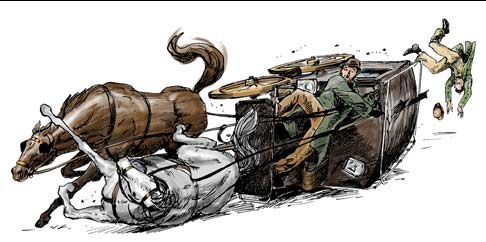
I have faced the cavalry of Ayub Khan and ridden a war pony stolen from the Pashtu, as its owner swept down a rocky gully behind me, brandishing a rifle. I rode with Karim Bey across the Wild Pass in the Serbian rebellion of seventy-eight. I have seen a major in the Bengal Lancers take a wild pig through the fundament, only to have his spear bury itself into sun-baked mud beneath.
Good days. I miss them.
My name is Colonel John Hamish Watson, late of the Bombay Sappers and Miners. I know the weight behind a charging horse. I have faced it and lived. Four fine horses harnessed to a carriage whipped by one of the Queen's own coachmen carries enough force to smash a stone wall. So you will understand why I had little hope for the fool who stepped into my path on the high road through Kingston upon Thames.
There was, of course, little reason for my coachman to be whipping his horses so fast but I like to make my journeys at speed; the empire is large, the number of us who play the game surprisingly small and the rules complex, as you will realise from the fact I fought at Stara Planina with Karim Bey rather than the Serbs.
The first I knew of disaster was a shout from Hunter, followed by the frantic neighing of his horses and a thud. Something heavy catapulted across the roof of the carriage and tore varnished canvas above my head. A woman shouted, and the carriage tipped sideways.
We travelled maybe five paces before the first of the horses went down, tripping that behind. The scream of a wounded animal is something one never loses. It was such a scream, heard in the hills behind Kandahar, which convinced me Mr Darwin was correct and we did not, after all, rank between the angels and the animals. A man with his leg badly broken sounds little different to a horse in similar straits.
Using a window, which now showed only clouds, weak sunlight and the grey of an English sky, I crawled from the carriage, to find Hunter already knelt beside the head of a magnificent grey, tears in his eyes.
"Done for," Hunter said. "Legs, ribs... All broken." For Hunter this was almost a speech.
"Bad luck," I said. Undoing my loden coat, I loosened a holster that kept a Bulldog in place. "Here."
Taking my proffered revolver in silence, the coachman put its blunt muzzle to the side of his horse's head.
"At the back," I suggested, "or directly from the front. I can do it if you'd rather."
Hunter stared at me, although it's unlikely he saw much.
"Let me," I said, and when he looked doubtful, in as much as a face carved from Irish oak can carry that expression, I admitted something few people know about me. "I have a fine understanding of anatomy."
"You Sir?"
"I used to be a surgeon."
There are advantages in my world to being seen as a cold blooded killer, and to admit to saving as many as I had killed. Such admissions can do harm. Although the truth is far stranger, because I have killed fewer people than most believe and saved many more than I am prepared to admit.
Taking the revolver from Hunter, I clicked back the hammer and clambered across a broken shaft to reach the animal's head. Speak kindly and most people will give you their trust. The same applies to animals. With one hand I stroked the dying animal and with the other I put my revolver between its eyes and pulled the trigger. It died with a kick and a spasm, but the fact its skull contained myriad cavities did much to baffle the sound and gave me an idea for later.
"Thank you, Sir," Hunter said, thus using up another week's worth of words.
It was only then I remembered the unfortunate cause of our crash. I could see where he lay by the interest his agony attracted. A smaller crowd had come together around my wrecked carriage, drawn by its quality, but a far larger crowd was gathered a dozen paces behind this, and it was here the human cause and casualty of our accident lay.
They grew quiet at my approach, the crowd. Men fell back and women looked away, averting their eyes. A small girl burst into tears and a youth old enough to know better stared openly into my face. That was when I realised it was my revolver which earned their silence.
"You have killed me..." The voice was high, slightly strange and the man who spoke indeed looked on the edge of death, which was an improvement on what I had been expecting.
"It is always a bad idea to step in front of a moving carriage," I replied, unwilling to have him meet God believing the fault mine.
"Please," he said, "fetch me a doctor..."
He had the hollow face of a classics master and the fingers of a second violinist, somewhat bitten around the nails. Behind me, I could hear muttering and a woman bustled forward, mouth already opening to share her news. "A doctor recently took residence in a street behind." Several of the crowd began to agree, and one, a clerk from his dress, which was careful if none too clean, crouched beside me and offered to fetch this man.
I am a...
I almost said those words aloud, but instead I gave the clerk a guinea, to show the doctor his fee would be paid and told the man to run as swiftly as possible. Had I done what first occurred to me and announced myself a medical man, my coming retirement might have been very different.
"Tell your doctor to hurry," I said. "This patient needs urgent attention."
A man running is always a ridiculous sight and the clerk confirmed this fact, his feet slapping cold cobbles and his elbows flexing like the wings of a game bird. A handful of seconds after he started, he disappeared down a narrow alley in a sideways skid that almost had him on his back. With nothing else to occupy the seconds, I sat back and waited.
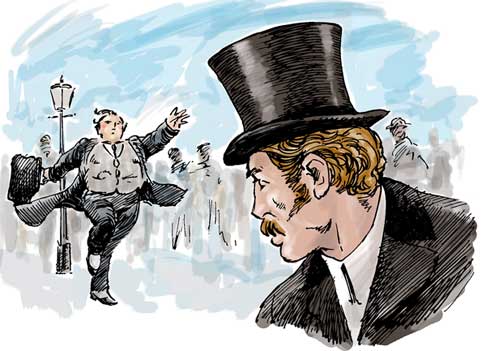
Close examination of human blood has taught me three things. It is as thick as paint, it is surprisingly nutritious and, finally, like excreta, we do not find that our own excites a reflex of disgust.
The man lying on cobbles kept gagging at the taste of the watery red liquid which dribbled from his lips, and it was this that gave him away. A sponge, I guessed, hidden in the corner of his mouth and worked by his tongue. Chicken's blood, most probably, it looked too thin for pig.
His legs lay at strange angles, no bones visible through the cheap tweed of his trousers but obviously broken, at least, obviously broken to those who did not know how such breaks looked in real life.
If the clerk had looked ridiculous, the doctor was even more so, his short legs pumping and his face as red at that of a Sioux brave. He wore a frock coat that had seen better days and once belonged to someone else; unless our man had shrunk several inches in height as he filled out around his waist.
"Stand back," he demanded. "Stand back."
Those around the injured man did as they were told.
"Ahh," said the doctor, seeing me stand alone. "You must be the unfortunate owner of that unhappy..." Shrewd eyes flicked from my carriage, which had him frowning, to my clothes, which seemed to put his mind at ease.
"A shocking accident, he said, "most shocking." A refrain quickly taken up by a woman in the crowd and then by several people around her.
Kneeling, the doctor touched his hand to the victim's throat in a manner that would have been entirely convincing had be been checking a body for a pulse. Since the patient's eyes could be seen fluttering in his head such checking seemed entirely redundant.
Next the doctor reached inside the thin man's coat to feel for his heart, and when the doctor took his hand away, his fingers were red with blood. This was enough to make a woman faint. Needless to say, it was the woman who'd first taken up his refrain and as she fell, she twisted to land elegantly, revealing rather more ankle than was seemly.
This seemed to make the doctor angry.
"Hysteria," he announced. "Not helpful." The fat little man eyed me grimly. "All the same, not surprising. Such a shocking accident..." His smelling salts left the woman with tears running down her face.
An attempt to straighten the injured man's leg produced a shriek of such pitch that it unsettled one of the horses now being cut from its harness. I knew this because Hunter swore, despite the tender sex of many of those around him and swore almost as loudly as the man had screamed.
The fat little doctor stood, shook his head and turned towards me. "If we could talk...?" he said, taking my elbow.
We walked together towards the bridge, while those around us fell back as if afraid of the weight of guilt they believed I carried. The sky was still grey, the river little brighter than the surface of a rusty sword. A chill wind swept along its surface, and although this was nothing to the winds which blow so fierce in the Hindu Kush that they carve rock before one's eyes, it was in keeping with the drabness of a drab town. In England, bless it, everything works on a smaller scale.
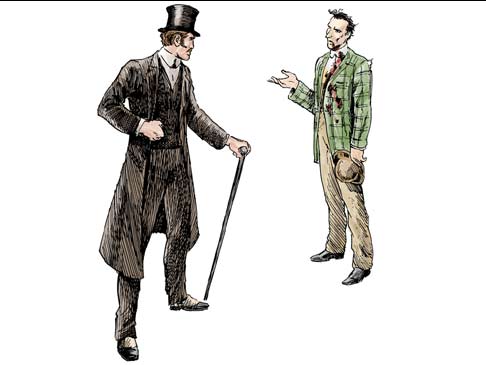
"You are a gentleman," he said.
When a man says that he means he considers you his equal. I found this idea amusing, although I was careful to keep that from reaching my face. As a young man I walked through the aftermath of the massacre of Meerut, my skin stained with walnut juice and let not a single sight disturb the calm that carried me through crowds of rioting sepoys.
"Indeed," I said. "A gentleman and a soldier."
"And a man of comfortable means."
I was about to object but saw his eyes slide across my loden coat, which was lined with green silk. So instead of objecting, I muttered something non-committal, quintessentially English.
"This is difficult," he said. "Very delicate."
At that point, I was meant to ask why it was difficult. He waited and I waited some more.
"Very difficult," he added, as we turned back towards the press of people. "I'll be blunt. You're a gentleman and this is a dreadful accident. It is my best opinion that this man will die. I am sure someone has already sent for the police."
This I privately doubted, since the crowd were far too busy being shocked to do anything that useful.
"I can ease things," he said. "Let the patient be moved to my surgery. I will undertake to treat him."
"But he will still die?"
"Oh yes," said the fat little man. "Nothing I can do will stop that." He paused, with the manner of someone considering how far to risk his reputation. "I can, however, delay slightly in announcing his death. I will mention complications, the poorness of his constitution, perhaps even suggest a certain unsoundness in his mode of life."
"A more deserving man would have lived?"
"Indeed." The little man nodded, delighted at my quickness of wit. "There will be costs," he said. "Minor outlays. I can see the poor wretch's family on your behalf, maybe give his wife a few guineas towards a Christian burial and the keep of her children. My own fees will be modest."
Raising my eyebrows, I waited.
The sum he named would have bought a town in the Crimea.
"All in." he added hastily. "As would include my fees, outlay for his widow, a burial... Such a tragic accident," he repeated, shaking his head. For one hideous moment I feared the man was about to begin his spiel all over again, for we were nearing the crowd and the last thing I wanted was to waste more time on fainting women and chicken's blood sponges.
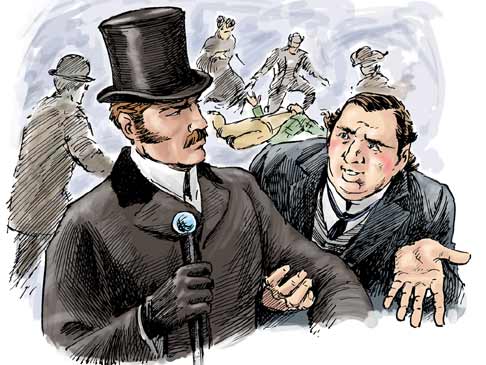
"Let me examine the patient," I said.
"You?" he said, sounding altogether less certain.
Put me in the path of danger and I will swear in the ripest Hindi. The man in front of me said his single word in an accent that spoke of education and birth. At times of great stress we all revert to the accents of our childhood. It seemed he was a rogue from choice rather than necessity.
"Did I not mention I was a surgeon?" Opening my coat further, to reveal the gun beneath, I began to push my way through the crowd.
"Look at me," I demanded of the groaning man, and he opened his eyes with a great deal of fluttering and a dying fall of sobs, all the more convincing for being slight.
"Now focus on my finger."
I moved this digit and watched his eyes trail after, delayed by a single second and inclined to roll back in his head. Mind you, good at acting or not, I could always use any man prepared to step in front of charging horses, catapult himself above a carriage and dislocate his own leg on landing.
Gripping that leg, I put my other hand to his knee and pulled, twisted and pushed almost simultaneously. The wretch gave a hideous shriek, more from shock I suspect than anything else and forgot to keep his eyes half focussed.
"See," I said, "good as new." To make my point, I worked his knee as one might work the leg of a horse. In the crowd someone began to clap.
"Those ribs," I added. "How are they feeling?"
His cast his eyes behind me to the fat man who hovered anxiously at my shoulder. Whatever passed between them, the wretch now sprawled on the ground sighed, his face already resigned.
"Better," he said.
"Let me." His ribs were fine, the sponge actually a bladder sewn into the side of his shirt and worked by pressure. Our man with the narrow face and darting eyes was so busy worrying that I might identify the object beneath my fingers, that he entirely failed to notice when I lifted his wallet.
"Nasty swelling," I said, pocketing that object as I wiped my fingers on the side of my own trousers. "Otherwise, just a graze." Helping the man to his feet, I held him steady as he found his balance. It was a nice touch.
"Your name, Sir?"
The man looked at me. "Sigerson," he admitted finally. "Professor Sigerson."
"Professor?"
"An American university. In San Francisco. A thoroughly modern institution." He managed to imbue this description with a level of approval which would have been missing had the words come from my mouth.
"And your friend?"
"My brother," he corrected.
Had someone told me those two men were picked at random from a thousand such, rounded up off the streets of London I would have believed him. The idea that they shared the same blood was an altogether stranger proposition. One man was fat and small eyed, the other tall and beak nosed, with eyes that belonged to an Ottoman potentate.
"Professor Sigerson," I said, offering my hand. "Pray let me call on you to confirm your recovery..."
***
Needless to say, the address given me was as fake as the name. The house in which this man really resided was behind the new railway station. A shiny brass plate by the gate announced it as the residence of Professor Sigerson, thinker & Dr Sigerson, general physician.
The screws holding this unlikely announcement were new, but a hundred tiny scratches at the four corners spoke of other walls and hurried exits. At least, so Hunter told me when he returned, following them being the task I gave him while I found a blacksmith to repair the broken rim of our wheel.
So, it was entirely my fault the two Sigersons had vanished by the time I presented myself at their door. Stripped bare, their rooms echoed to the sound of my search, even the carpets having been spirited away. A very agitated landlady, who had appeared out of breath, shortly after I had Hunter break down the door, kept demanding of me what kind of fiends stole everything.
"Efficient ones," I told her, although I fear she did not entirely understand my joke. The constable who'd accompanied the landlady began to make notes and, as I listened, her list of items grew longer and ever more valuable.
"I will never get them back," she wailed.
" On the contrary," I said, "you can have them this very afternoon with almost no effort..."
It never ceases to sadden me the things that amaze closed minds. The sun setting over the Hindu Kush, with wild dogs circling the last flames of a fire destined to die before dawn; waves deep enough to swallow St Pauls in one watery gulp; the innocence of a Nepalese child goddess so beautiful grown Generals cry in her presence, such things are put on this earth to stun us. To be amazed by anything less seems an insult to intelligence.
As I suspected, my comment that her goods would be returned proved enough to silence the landlady. Although I then had to explain to the constable that my certainty the carpets could be found at the nearest pawnbroker was more to do with common sense, than any intimate, not to say inside, knowledge of the crime.
"We must be off," I said.
The constable looked as if he might object but changed his mind at a glance from Hunter, who wore the badge of a Queen's Messenger beneath his coat. There my day might have ended, with an interesting meeting and my giving Inspector Lestrade descriptions of the two rogues and an order that I be notified when they were found. And so it would have ended, if Hunter and I had not proved woefully incapable of paying the blacksmith for his work on the wheel.
"Sir?"
I fumbled at the pig-skin bag in my hand and then stopped, angrily. I am not a man who fumbles. In it I felt a map of the empire painted onto silk, my cigars, which actually broke open to reveal sticks of hashish, which the dear Queen herself uses for pain, a little opium, a throwing knife, a set of prayer beads given me by Kais Bey.
Everything was where it should be, except my reward for work well done, the bag of gold I'd gone to Windsor to collect. Apparently, while I was first curing our accident victim, the fat little doctor had come to take a look at my carriage. This, it appeared, was not all he took.
"Sir?" said the blacksmith.
"Here," I replied, impatience winning. With a flick of my wrist, I took the throwing knife and slashed open the bag's handle, revealing a dozen half-sovereigns sewn into a sealed silk tube. I took three coins, more than his work was worth and gave them to the man. "That also buys your silence," I told him, nodding towards the ruined bag.
He left without another word.
It was then I turned to the rogue's wallet and found my first real clue and proof of his name. The clue came in the form of a train timetable and the name from a scrap of newspaper. Sherlock Holmes, younger brother to Mycroft and pupil of Professor James Moriaty. Almost every detail in the report was wrong � the events described took place at St Jean, not Pau, in August 71, not March 72 - but the scribbler was right about one thing, there had been a scandal.
When I put my mind to things I can make them happen quickly. So it proved in engineering my next meeting with the elusive Mr Holmes. The man had money, my money, he had no need to visit the town underlined in his railway timetable, but he would visit it just the same. I'd felt his heart beneath his shirt and it had been racing. He lived for the challenge. No man is so poor he has to jump in front of four galloping horses.
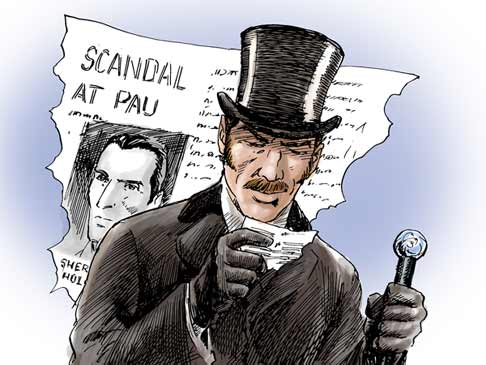
I would have taken Hunter with me, for he is a coachman beyond the ordinary. But the moment Hunter finally realised the crash on the road through Kingston upon Thames had not been an accident, and one of his best greys had been struck down in the course of a simple confidence trick, he vowed to hunt and kill the men responsible. He did so with such barbarity that I cannot even bring myself to put his threats down upon the page.
Choosing Edwards instead, I took a two seater Hanson drawn by a single horse and a huge cloak in which to disguise myself. I chose an open-top carriage, because I was interested to see how Mr Holmes would handle his fall with no roof on which to somersault.
The city to which we travelled was barely more than a Hampshire town with pretensions to history. It was, however, well chosen. Winchester High Street is long and sloping and overlooked by a grain merchants and a general store, both busy with yeoman farmers, plump wives and red-faced gentlemen, the kind of people one expects to see in such a place.
We wasted a morning hunting for the brass plate, newly put up on the pillar of a narrow house in St Peter's Street, and the afternoon checking that both rogues were in the city and then Edwards spent his evening in the kind of tavern used by coachmen and servants. I was French, apparently, he was pleased with that touch , newly arrived from Paris and I spoke little English and greatly valued my privacy. Small wonder the brothers Holmes found us impossible to resist.
They took it in turns to watch my hotel for the rest of that night, only abandoning their watch when Edwards strode from his nearby lodgings to prepare my coach.
"Vite, vite.."
As instructed, he conveyed me down the High Street slightly faster than was decent and, as we passed the Buttercross, with its collection of ragged urchins seated around the base, a man stepped absent-mindedly into the road in front of us and was sent flying.
A woman screamed and Edwards began to apply the brake. A farmer stepped into the road to make sure we did not try to escape and then stepped back quickly, when Edwards took his hand from the lever for a few seconds. This time round the horse was unhurt and my carriage still whole. Which meant that all of the crowd's attention could be concentrated on the fallen man.
"He needs a doctor," said a woman. "Such a terrible accident. He needs..."
"Madame," I said, clambering down. "I am a doctor. And, as it happens, I am familiar with such accidents, having seen one almost identical only last week." This time, when she fainted it was with no elegant twist or display of ankle, she merely crumpled and hit her head upon the kerb hard enough to make her nose bleed.
"Mr Holmes, allow me." Taking Sherlock's leg, I pulled, twisted and pushed it until I felt the bones slot back into place. Someone in the crowd nodded in approval and allowed that I would make a good vet.
As Edwards carried the unconscious woman to safety, I turned my attention to the man on the ground. In the few seconds it had taken me to adjust his leg, I had watched Mr Holmes check all four exits from the Buttercross and realise, instantly, that these were closed. He'd noted Edwards carry the woman toward a waiting police van and seen his brother appear and disappear at the sight of trouble; not that this would be a problem. Lestrade had made a call to the Chief Constable of Hampshire, one of the few men in the county to possess a telephone. All the help I needed was available. I had no doubt that Mycroft Holmes was already in captivity.
"You have three choices," I told his brother.
Since this was two better than Sherlock had imagined, I had his full attention. "You can be arrested and hope you die in prison..."
"I doubt," he said, "that I should ever hope this."
"How old are you?"
"Twenty six," he admitted.
"Hunter is thirty," I told him. "He is the coachman whose horse you killed in Kingston. He comes from a family that never forgets and has little interest in forgiveness."
"My other alternatives?"
"Try to escape and be shot down."
"By you?"
I nodded. "By me, by my coachman, by that good detective standing over by the van. Does it make a difference?"
He allowed that it did not. "And my last choice?"
"Work for me. I need a man who can throw himself in front of carriages, think on his feet, lie when necessary and hold up a mirror to dazzle the public. The work will be hard and dangerous, it will require levels of intelligence few men possess. You will have no official standing. In return, you will be provided with a pardon, lodgings, a housekeeper, funds, access to any delicate information you need, and an assistant."
"My brother?"
"I have other plans for Mycroft."
"Then who?"
"Me," I told him. "Your assistant will be me."
"What about Hunter?"
"You will be working for me. I work for the Queen. Hunter is the Queen's favourite coachman. He will growl at you and I will take care not to introduce the two of you before time, but he will respect your position."
"Which is what?" Few of the crowd remained to see Sherlock Holmes pull himself to his feet, glance quickly around to check the alleys were still blocked and turn back to me. He checked from habit only, his decision already made, there are some things one can see in a man's eyes. "What am I to be called? "
I shrugged. "Whatever is appropriate. Do you have something in mind?"
"Consulting Genius," he suggested, with no appearance of shame.
I smiled, amused by his vanity. "I will put that to the Queen," I promised. "Although you might have to settle for a little less."
Author's notes
Jon Courtenay Grimwood was born in Malta and christened in the upturned bell of a ship. He grew up in the Far East, Britain and Scandinavia. He travels regularly to the US and North Africa.
Pashazade, the third of his Ashraf Bey mysteries, won the 2003 BSFA Award for Best Novel. His work has also been shortlisted for the Arthur C Clarke Award, the British Fantasy Award and the John W. Campbell Memorial Award (in the US).
When not writing novels he works for magazines and newspapers, including the Guardian and SFX. He is married to the journalist and novelist Sam Baker, and they divide their time between London and Winchester.
His new novel, Stamping Butterflies, is set during the birth of punk, half way across the galaxy, and a few years from now in the Mediterranean, where US marines are keeping prisoner a man who has just tried to shoot the American president. It has been called 'mind-bendingly good.'
About the writing of the story, Jon says:
"Dr John H Watson has always got a raw deal, particularly in film and on television. If you read the original novels and stories you quickly discover that Watson is a competent, intelligent and educated surgeon who has seen action in Afghanistan. (Something that most films usually fail to make clear.)
I wanted to write a story in which Watson was driving force, in this case literally! Holmes is clever, highly strung and undeniably brilliant, but he needs Watson. What I have tried to do is make Watson the major character and show how this rather complex friendship began, by having Watson effectively rescue Holmes from a life of cheap trickery and panhandling.
Writing Victorian London is always a joy, because the grime and carriages, the smell of horse dung and crowds make it easy to summon up. It's also a period that most people know from reading or film, so plot references don't need to be explained in quite the same way.
This wasn't the story I set out to write, that was going to include vampires and time travel, but once I had Watson in his carriage charging across the bridge at Kingston upon Thames the horses literally took over."